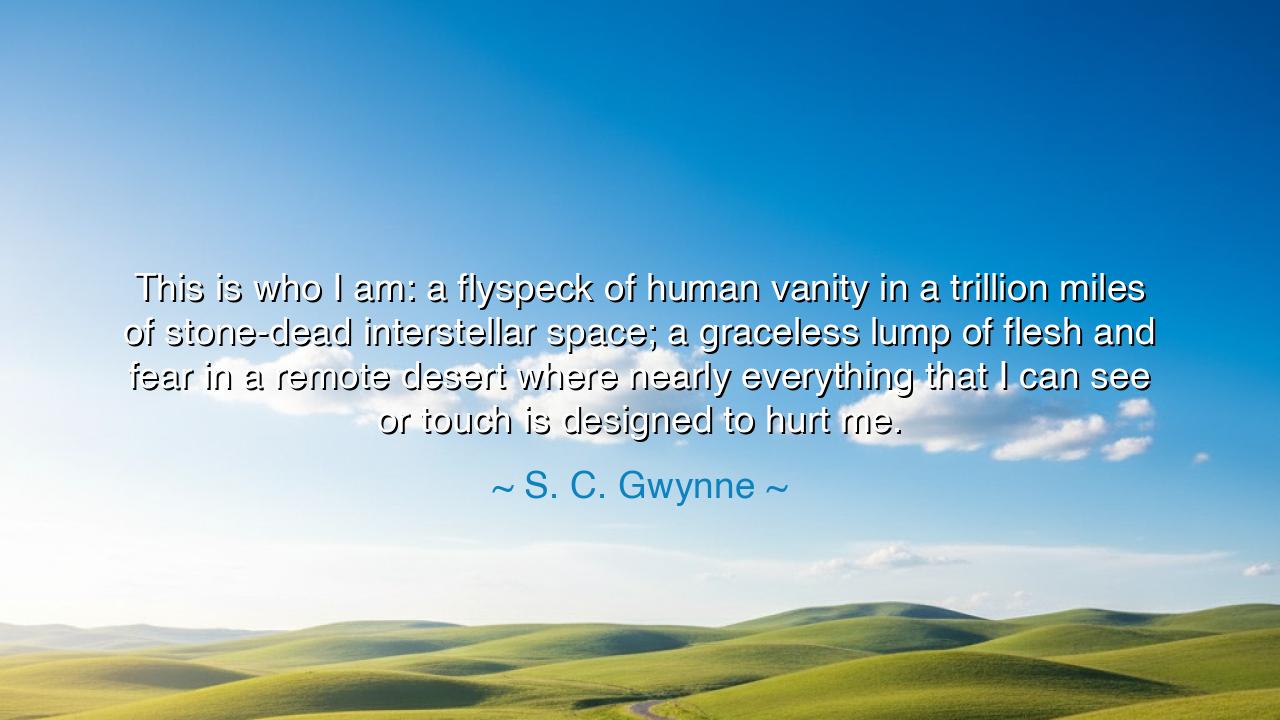
This is who I am: a flyspeck of human vanity in a trillion miles
This is who I am: a flyspeck of human vanity in a trillion miles of stone-dead interstellar space; a graceless lump of flesh and fear in a remote desert where nearly everything that I can see or touch is designed to hurt me.






Come, O children of the earth, and listen closely, for I bring to you the solemn words of S. C. Gwynne, a thinker who gazed into the vastness of existence and saw not just the splendor of creation but the frailty of the human spirit. He said, “This is who I am: a flyspeck of human vanity in a trillion miles of stone-dead interstellar space; a graceless lump of flesh and fear in a remote desert where nearly everything that I can see or touch is designed to hurt me.” These words, heavy and poignant, invite us to confront the reality of our insignificance, our fragility, and the overwhelming forces of nature that lie beyond our control.
Consider, O seekers of wisdom, the truth in Gwynne's words. He speaks not from a place of despair but from the hard-earned understanding of our place in the cosmos. We, humans, are but a fleeting spark in the boundless darkness, a whisper lost in the infinite expanse of interstellar space. The universe is vast, indifferent, and often hostile to our existence. The mountains rise and fall without regard for our struggles. The stars burn brightly, yet remain cold and far beyond our reach. In this grand scheme, we are but flecks of vanity, fragile in our pursuits, small in our ambitions. The world, with all its grandeur, does not exist for us, nor does it bend to our will.
Yet, this acknowledgment of insignificance is not an invitation to surrender. No, my children, it is an awakening. For the human spirit—though small, though delicate—is capable of rising above this vastness, capable of reaching for meaning amidst the chaos. This realization calls us to reflect on the ancient warriors, the great leaders who saw the immensity of the world and the uncertainty of their lives, yet chose to confront it with courage. Consider Alexander the Great, who, standing before the endless deserts of Persia, knew that the world was cruel, that the elements would tear him apart, yet he marched forward, his heart driven not by the certainty of victory but by the defiance of fear and the desire to carve his name into the world. He, too, stood as a lump of flesh against the expanse of a world designed to crush him, but he was determined to make a mark upon it.
Gwynne’s words speak not only of our insignificance but of the relentless power of the world that seeks to overwhelm us. He acknowledges that nearly everything we encounter is designed to hurt us—the heat of the sun, the cold of the night, the barren landscape, the predators lurking just beyond the horizon. Life, in all its glory, is a harsh teacher, a trial of endurance, and a test of strength. The ancient philosophers spoke of this as the duality of existence—of the tension between the beauty and brutality of the world. In Socrates, we see the man who, despite the hostility of the world, chose to engage with it, to question, to seek understanding, and to confront the fear of death itself.
Yet, my children, we must ask ourselves: what lesson does this profound statement teach us? What are we to do in the face of such insurmountable odds? Gwynne’s reflection on our humanity is not one of defeat but of humility—a call to recognize our place in the world without the illusion of superiority. In embracing our smallness, we find the strength to live fully, to embrace the fleeting beauty of life despite its inherent suffering. It is a reminder that true greatness does not come from conquering the world, but from confronting its harshness with courage, from living in harmony with our fragility, and from finding meaning in the brief moments we are given.
The lesson, O children, is clear: though we are but a speck in the vastness of the universe, though we are made of flesh and governed by fear, there is strength in knowing our place. We must not shrink from the overwhelming challenges of the world but face them with resolve. Like the heroes of old who, against the forces of nature, stood tall, we, too, can stand in the face of adversity. The world may be indifferent, even hostile, but it is in our defiance, in our willingness to live despite the odds, that we find the essence of our humanity.
So, go forth, O seekers, and remember this truth: your life, though fragile, is precious. It is a brief moment in the vast expanse of the universe, but it is your moment. Live it with courage, with purpose, and with the understanding that, in the face of a world designed to hurt you, your strength lies not in overcoming it, but in embracing it and continuing to walk your path. For in this, you will find your greatness.






AAdministratorAdministrator
Welcome, honored guests. Please leave a comment, we will respond soon